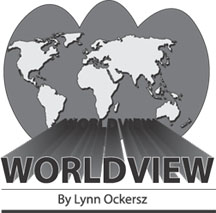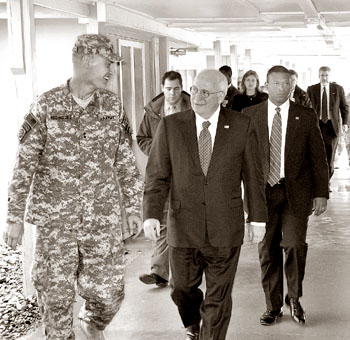Rising challenge to Western power in Afghanistan
 A recent suicide bomb blast at a US military base just outside Kabul,
which was apparently aimed at visiting US Vice President Dick Cheney, in
which he escaped unhurt but which saw several others losing their lives,
is a disquieting pointer to the mounting perils US power is encountering
in South West Asia. A recent suicide bomb blast at a US military base just outside Kabul,
which was apparently aimed at visiting US Vice President Dick Cheney, in
which he escaped unhurt but which saw several others losing their lives,
is a disquieting pointer to the mounting perils US power is encountering
in South West Asia.
It was also a chilling reminder that the Taliban is once again
proving a military factor to contend with in Afghanistan. Over the past
few months, the Taliban, supported by the Al Quaeda, has made its
presence increasingly felt in the Afghan theatre and the chances are
that the US-led NATO forces there would find their "law and order"
chores increasingly difficult to carry out.
|

AFGHANISTAN: US Vice President Dick Cheney (2nd-L) walks with Major
General David Rodriguez (L) after having breakfast with US soldiers
at Bagram Air Base, in Afghanistan 27 February, 2007. A suicide
bomber killed several people outside the main US military base in
Afghanistan in an attack aimed at Cheney, but he was not hurt in the
blast. AFP |
The bloody incident at the US military base comes against the
backdrop of the frustrating military gridlock in Iraq for the US and the
mounting civil war carnage there, which has, of course, spurred a major
public debate in the US on the ultimate purpose in attempting to project
US power in the region.
We are apparently seeing a shift in US policy on Iran and Syria with
Washington now agreeing to a "neighbours' parley" with these states with
which it has had strained relations, along with Iraq.
This could be a response to rising domestic criticism of US policy in
the region and the mounting American anti-war sentiment but there is
unlikely to be a substantial dilution of the fundamental US policy of
maintaining a high military presence in the Gulf region. The visit by
British Foreign Secretary, Margaret Beckett, to Afghanistan for top
level talks with the latter's leadership, close on the heels of Cheney's
visit to Afghanistan for the same purpose, underscores Western concern
over politico-military developments in the Gulf region in general and
over the re-emergence of the Taliban in Afghanistan in particular.
Apparently, the compulsion is great for the West to continue to
project its military power in the Gulf, although it may try out
tension-defusing measures in the short and medium terms, such as
entering into a dialogue of sorts with Iran and Syria.
The fact is that South West Asia and the Gulf have been of abiding
interest to the West on account of their strategic natural resources,
such as oil, and their vitality from the geo-political standpoint. Under
conservative Republican administrations, such as that headed by Ronald
Reagan, the US power projection tendency in the Gulf has been greater
than under Democratic dispensations, but the fundamental US policy of
maintaining a military presence in the region has not changed and is
unlikely to change.
However, the region would turn out to be an increasingly
fiercely-contested arena, given the brutal and staunch resistance
offered by the Taliban and its allies to the Western military presence.
In contrast, the Soviet occupation of Afghanistan and the resistance
offered by the Mujahedin of those years, may seem mild and less
lacerating.
Interestingly, it is the Afghan Mujahedin, helped militarily by the
West in the Soviet occupation years, which has assumed the guise of the
Taliban today. However, in an ironic reversal of roles, the Taliban is
today taking on the US led NATO forces.
Compared to the issues thrown-up by the ethno-populist explosion in
South and South West Asia today, the Soviet occupation era questions,
proved less intractable. Twenty five after the Soviet occupation, these
regions are a hot bed of identity-based conflicts which the Western
military presence only intensifies.
The West played its hand deftly by backing the democratic process in
Afghanistan.
The presidential polls held there some months ago, for example,
proved that Afghanistan could be turned into fertile soil for the
institutionalising of democracy.
Such processes need to take root or firmer root in the restive
regions of the Afghan-Pakistan border. This could help in defusing
ethnopopulist tensions to a considerable degree.
However, the gains from such processes could be reversed if the West
insists on perpetuating a marked military presence in these regions.
[email protected]
|
